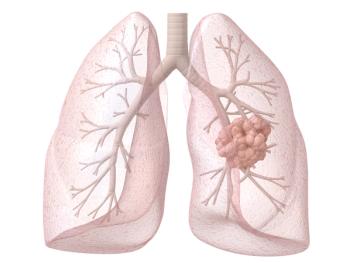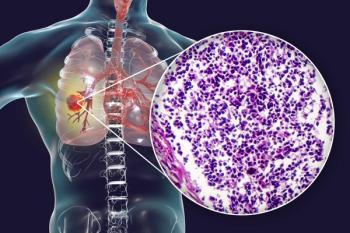
Small Cell Lung Cancer (SCLC)
Latest News
Latest Videos
More News

Real-world data may support a new way to consider follow-up treatment for patients who are older with extensive-stage small cell lung cancer.

Investigators will assess the safety, pharmacology, and maximum tolerated dose of ST-001 in relapsed/refractory SCLC as part of a phase 1a/1b trial.

CHMP Grants Positive Opinion to Tislelizumab/Chemotherapy in Frontline ES-SCLC
Tislelizumab plus chemotherapy demonstrated superior OS, PFS, ORR, and DOR results compared with placebo plus chemotherapy in first-line ES-SCLC.

Intravenous olvi-vec demonstrated a manageable safety and tolerability profile consistent with previous trials evaluating the investigational agent.

Considering Dosing and AE Management Strategies With Tarlatamab in SCLC
Experts from Washington University in St. Louis discuss prior data and strategies for mitigating toxicities like CRS associated with tarlatamab in SCLC.

Real-world atezolizumab plus chemotherapy data demonstrated similar efficacy compared with what the phase 3 IMpower133 trial showed.

In patients with small cell lung cancer, Lambert-Eaton myasthenic syndrome leads to muscle weakness and can be discovered with no-cost testing such as anti-VGCC antibody testing.

Pooled analysis data support atezolizumab continuation as a viable second-line therapy option in extensive-stage small cell lung cancer.

Following promising results from a trial investigating the effects of 225Ac-SSO110 on Balb/c nude mice injected with the xenograft model of SCLC, IND clearance was granted by the FDA.

Support for the recommendation is based on phase 3 ADRIATIC trial results showing a 27% reduction in the risk of death with durvalumab vs placebo.

A phase 1a/1b trial showed that ZL-1310 elicited an ORR of 74%, all of which were PRs, in patients with SCLC who received prior chemotherapy.

Sacituzumab govitecan showed promising response and survival data in the extensive-stage small cell lung cancer cohort of the phase 2 TROPiCS-03 trial.

Results from the phase 3 ADRIATIC trial led to the approval of durvalumab in limited-stage SCLC.

Promising phase 1 data appear to support further evaluation of ZL-1310 as a treatment for patients with extensive-stage small cell lung cancer.

Offering certain radiotherapy modalities based on disease burden may play a role in the outcomes of those with ES-SCLC, according to James Ninia, MD.

Developers plan to submit a supplemental NDA for this combination as a first-line maintenance therapy for ES-SCLC in the first half of 2025.

Results showed of the phase 3 ADRIATIC study found that treatment with durvalumab elicited similar radiation pneumonitis incidences vs placebo for LS-SCLC.

James Ninia, MD, discussed a phase 2/3 trial seeking to answer whether complete consolidation offers more benefit than incomplete consolidation in SCLC.

Overall survival benefit was significant with complete vs incomplete consolidation therapy, but lost significance when stratified by disease burden.

James Ninia, MD, discussed treatment options for patients with extensive-stage small cell lung cancer undergoing metastasis-directed radiotherapy.

Data show that twice-daily radiotherapy may confer improved survival vs once-daily radiation in patients with limited-stage small cell lung cancer.

BMS-986012 in combination with nivolumab/chemotherapy showed numerical PFS improvements in those with and without brain metastases at baseline.

The magnitude of benefit with durvalumab was particularly consistent within prophylactic cranial irradiation and radiation subgroups in the ADRIATIC trial.

Supporting data for the designation comes from the ARTEMIS-001 trial evaluating preliminary safety and antitumor activity of GSK’227 in solid tumors.

Data from the phase 3 ADRIATIC trial support the supplemental biologics license application for durvalumab in this limited-stage SCLC population.















































